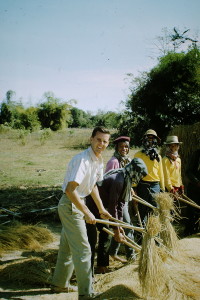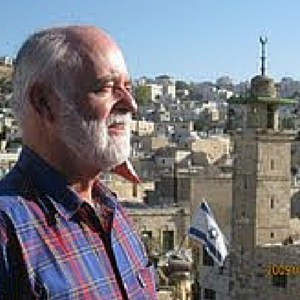“I need to talk to you, privately. Follow me.”
He drove out of the village several miles, then stopped. When he turned off his headlights, I couldn’t see my hand in front of my face. But I could hear his voice. “The kamnan wants to kill you.”
I was instantly enraged. “No, I’ll kill him first!”
My response was typical 1950s American. Mom and Dad always voted Republican. When I entered UC Berkeley in 1960, ROTC was mandatory for all male students. No one objected. Everyone I knew believed WWII proved that violence was a necessary evil.
I went to Thailand with the Peace Corps in 1965. I was assigned to supervise construction of a water treatment plant in a large village in a poor province. I worked six days a week in the tropical heat and mosquitoes, and lost 50 pounds to dysentery.
After two years, the project money disappeared. Many villagers were upset—they had each paid the assessment out of their own pockets. Most believed the kamnan (head of the township) had simply pocketed the money (corruption is, unfortunately, endemic in Thailand). Many villagers complained to me. Some asked me to talk to the kamnan.
The kamnan was formidable. He was old but built like a tank, four inches shorter than I but twice my weight. His teeth were glossy jet black, from a lifetime of chewing betel nut (a mild narcotic in Southeast Asia). He had a single indigo tattoo, in a dense floral pattern, covering 80% of his body. He was gruff and commanding, and he had four wives (unusual for a Buddhist, but then he was not usual in any way).
No one spoke English, so my Thai had become fairly fluent. I knew it was taboo in  Thai culture for a younger man to question or criticize an elder. I thought the kamnan might tolerate a non-Thai who broke the taboo in private. “Many of your villagers are upset about the disappearance of the money. I too am upset—I have worked very hard for over two years, and lost my health, but now all my effort is wasted.” He sat in front of me, frozen and silent. After a long, awkward silence, I excused myself and left.
Thai culture for a younger man to question or criticize an elder. I thought the kamnan might tolerate a non-Thai who broke the taboo in private. “Many of your villagers are upset about the disappearance of the money. I too am upset—I have worked very hard for over two years, and lost my health, but now all my effort is wasted.” He sat in front of me, frozen and silent. After a long, awkward silence, I excused myself and left.
A few weeks later, an evening meeting was called in the village. Since I lived five miles away in the provincial town, I rode out in my old Italian Vespa. But as I approached, the provincial development officer, whom I knew quite well, flagged me down. “The meeting has been canceled. But I need to talk to you, privately…”
My rage lasted several days. I stayed away from the village, but I woke every night, grinding my teeth. Then I began to fear, listening for footsteps in the night, watching the curtains for moving shadows. I began to plot retaliation, to go out to the village at night and put a bullet through his house, but high enough to not hit anyone. When I realized that would be too obvious, I decided to put the bullet through his opponent’s house, as if the kamnan had done it.
Then I had a daring vision. From a distance I saw myself walking back into the village with a companion. It was broad daylight, and we were unarmed. I suddenly realized that my companion was a messenger from God. He said nothing. But his message was crystal clear: “No secrecy, no violence. That is not how the universe works. Put your life in the hands of your enemy. And no matter what happens, I will walk with you.”
The above photos are provided courtesy of Lorin Peters. Read Lorin’s follow-up piece, “Discovering Gandhi.”










Beautiful post!
Thanks. Dreams/visions can speak as much as any other talk, and I’m glad to hear of yours. Seems God speaks to each of us, at least sometime in our lives.